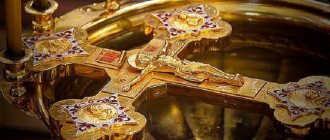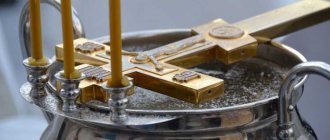Only an Orthodox clergyman can sanctify a home with holy water. If it is not possible to contact him, then you can perform the sacrament yourself. In order for everything to be done correctly, you need to know certain rules.
pravmir.ru writes about this
It is not enough to simply draw Epiphany water and make a cross-shaped movement with your hand, supposedly “blessing” the apartment. During the sacrament, a special prayer is read. Still, it is better to turn to priests for help.
Preparing for the consecration of the apartment for Epiphany
Anyone planning to consecrate an apartment on their own for Epiphany should know the rules for preparing for the sacrament. First of all, they put things in order in the home, thoroughly wash the floor, wipe off the dust, and hide all unnecessary items. All rooms must be in order. Basic Rules:
- the apartment should be well lit, so the windows should not be drawn with curtains;
- they consecrate the apartment on Sunday, but clean it the day before;
- before the sacrament you need to go to church so that the priest will bless you;
- When you return home, you need to wash your hands well and fill a clean bowl with some holy water. Read the prayer and begin the sacrament.
Blessing an apartment and not being close to the spiritual is wrong. The person who performs the sacrament must sincerely believe in God and never wish harm on anyone.
What does holy water help with?
You can moisten the face of a sick person with holy water, but you should not add water to the bathtub for bathing, since after bathing the holy water goes down the drain, and this is sinful. If for some reason the holy water has spoiled, it must be poured either into indoor flowers, or under a bush, or into running water.
To ensure that Epiphany water is always available throughout the year, regular water is added to the container as it is consumed. If for some reason you cannot come to the temple for holy water, and you still have water from last year, then you can, without any doubt, use this water as well as the holy water of the new consecration. This is very important in today's pandemic.
Here are practically all the answers to the most common questions about: how should you handle holy water? But very often church workers are asked the same question: what does holy water help with? There is a comprehensive answer to this question: from sin and from all kinds of misfortunes.
How to properly consecrate an apartment for Epiphany with holy water
Before consecrating your apartment on Epiphany, you must go to church to receive a blessing from the priest. You need to have icons, candles, and a prayer book with sacred texts with you. Prayer books are bought in churches.
On the evening of January 18, or in the morning of Epiphany, water is blessed in churches and taken home. Every member of the household should take a few sips. After this, you can consecrate the apartment to protect from troubles and everything bad. They sprinkle all the rooms, collecting water with a pinch of their right hand, making cross-shaped movements. They walk around the apartment clockwise, starting from the front door. The sacrament begins and ends in the same place.
Before consecrating the apartment, it is necessary to open or slightly open either the door or the window. Sprinkle the home with prayer.
How and where to store holy water
It is absolutely not necessary to completely fill your containers with water; you can add plain water to your holy water at home. When combined with holy water, plain water is also sanctified. Therefore, in churches, water from the tap is constantly added to the container with blessed water.
It is advisable to come for water with cans or plastic bottles; glassware often breaks in the commotion. No need to use flavored drink bottles. Labels from bottles must be removed, after which it is advisable to purchase special stickers from the temple that say “Holy Water.” This is necessary so that the container with holy water is not confused with ordinary water.
You should not drink directly from a container that contains holy water. And although this will not affect the quality of the water in any way, such an attitude towards holy water is considered impious. To drink, you need to pour water into some container.
At home, water should be stored in an appropriate place. It is not good, for example, to keep it together with alcoholic drinks or cosmetics; you cannot place the container on the floor.
A prayer that is read when consecrating an apartment on your own
O holy saint of God Blasie! In the contrition and humility of our hearts, we fall before you and pray: shine upon us, darkened by the slander of the enemy, with the light of grace from above, so that walking in it, we will not stumble our feet on a stone.
You, as a vessel chosen in honor and filled with the grace of God, we pray: grant us, sinners, the desired acceptance from your fulfillment, and heal our mental and physical ulcers, and ask the Lord for forgiveness of our sin and for our mental and physical health, salvation beneficial We always glorify the Father and the Son and the Holy Spirit, and your merciful intercession for our souls and bodies, now and ever and unto ages of ages. Amen.
Orthodox Life
Answered by Associate Professor of the Kyiv Theological Academy Andrey Muzolf.
To answer this question, you must first decide: what is holy water for? The famous Orthodox theologian of the last century, Protopresbyter Alexander Schmemann, once noted: “In the Church, water is sanctified so that it becomes what all matter is intended to be: the path to the ultimate goal - the deification of man, knowledge of God and union with Him.”
Thus, the purpose of holy water is, first of all, our sanctification. God sanctifies the nature of this world - water, bread, wine - so that through such sanctified nature man himself can be sanctified. St. Simeon of Thessalonica writes: “Simple water has the natural ability to cleanse bodily impurities and quench thirst, and holy water has the ability to wash away the soul along with the body, sanctify it, recreate it, spiritually irrigate it and adopt it as sons of God.”
In the prayer for the consecration of water, we ask God: “Thou Thyself, Lover of mankind, O King, come now by the influx of Thy Holy Spirit and consecrate this water. And give her the grace of deliverance, the blessing of the Jordan: create with her the source of incorruption, the gift of sanctification, the resolution of sins, the healing of ailments, the destructive of demons, impregnable to resisting forces, filled with angelic strength, so that all who draw and receive communion may have it for the cleansing of souls and bodies, for the healing of passions , for the sanctification of houses, and for all good... You yourself, even now, Master, sanctify this water with Your Holy Spirit. Grant to all who touch it, and who take communion, and who are anointed with it, sanctification, health, purification and blessing.”
Consequently, the sanctification given to us through holy water occurs not only through drinking it internally, but also through “touching” it and “anointing” it. That is why the priest, blessing the water, at the same time sprinkles people with holy water, since through sprinkling the omnipotent grace of God is also given to a person.
At the same time, we must remember that holy water itself will never sanctify us if we do not have the necessary spiritual attitude. Thus, Saint Theophan the Recluse writes: “All grace coming from God through the Holy Cross, holy icons, holy water, relics, consecrated bread (artos, antidoron, prosphora), etc., including the Most Holy Communion of the Body and Blood of Christ, has power only for those who are worthy of this grace through repentance, humility, service to people, works of mercy and the manifestation of other Christian virtues.
But if they are not there, then this grace will not save, it does not act automatically, like a talisman, and is useless for the wicked and imaginary Christians without virtues.” Thus, if we really want to receive benefits - primarily spiritual - from holy water, then we must sincerely believe in God, in His saving grace and try to live according to His Divine commandments.
Should I plunge into the hole?
Perhaps no other Orthodox holiday evokes such a cheerful response as Epiphany. Who doesn’t plunge into the ice hole on this day! And politicians, and artists, and just thrill-seekers. It is generally accepted that all water sources at Epiphany are sanctified by the Holy Spirit and the most extreme bathing cannot cause harm. Priests disagree on how to approach this folk tradition. On the one hand, every year videos appear on the Internet demonstrating how the priests are trying to popularize it, and they themselves plunge into the ice hole in all their attire.
“On the other hand, I can’t say that everyone is happy about it. Because the more this riot, the less desire there is to change your life and really get closer to God,” says Vladimir Yakuntsev, a senior teacher at the St. Philaret Orthodox Christian Institute. “Most priests do not welcome the excitement around Epiphany bathing. Because this arouses false hopes in people that Epiphany water is special, “alive”, like from a fairy tale, and acts magically: it removes the evil eye, and cleanses damage, and automatically washes away all sins, and is good for health. This is superstition, that is, an empty, vain faith.
As a result of immersion in water, no sins are cleansed and no health is added. This requires completely different efforts. Orthodoxy is the path of faith, the path of real self-change, the path of rebirth. So what does this have to do with the water you plunged into, thinking that it would be accompanied by some trick?”
Priest Vladimir Ivanov does not agree with this point of view. “So everything can be distorted! “But you can do it kindly,” he says. – We are now trying to return to the traditions of the past. After all, in the old days, drinking water was taken from a well and from a river. Therefore, there was no question of where to consecrate it for Epiphany - there, in the river. Someone took a dip. For Russian people this was nothing special. After the bath, everyone plunged into the snow, and some into the ice hole; many loved it, since everyone was closer to nature and a healthy lifestyle was the norm for everyone. So what’s wrong if people rejoice at it on a holiday and join in this way?
After all, many, although they rarely go to church, consider themselves Orthodox. They do not reject Christ, the Mother of God, and join the feast of Epiphany on their own, partly childish level. Nevertheless, if on a holiday a person wants to plunge into an ice hole in the name of the Father, and the Son, and the Holy Spirit, then thank you, Lord, that’s good!”
Another thing is that during a pandemic, people should be more attentive to their health and not expose themselves to danger. “Now is a special time, and hypothermia, as well as standing in crowded lines for holy water against the backdrop of a high risk of infection with coronavirus, can be costly for a person and his loved ones,” says priest Georgy Kochetkov. – Everyone should think about themselves, their family and everyone who depends on them. So I wouldn’t recommend taking too many risks these days.”
Why do people sprinkle their homes and things with holy water?
On the day of Epiphany, it is customary not only to drink holy water, but also to sprinkle premises and things with it. This is done so that they become not only ours, but God's. So that all those living in a consecrated house can always say to each other: “Christ is in our midst.”
It is well known how afraid every evil spirit is of holy water. But where there is no sincere repentance or prayer, the evil spirit, even after being expelled, returns.
“When the unclean spirit leaves a person, it walks through dry places, looking for rest, and does not find it; Then he says: I will return to my house from where I came. And, having arrived, he finds it unoccupied, swept and put away; then he goes and takes with him seven other spirits more evil than himself, and having entered, they live there; and the last thing for that person is worse than the first,” says the Gospel of Matthew (chapter 12, verses 43-45).
Why was the sinless Christ baptized?
Both sinners and Christ were immersed in the Jordan. But for the former it was a baptism of repentance, and forgiveness was expressed in washing. People went to the Jordan to wash away their sins.
Christ entered the Jordan to take upon himself all the consequences of man's sins, along with the suffering and pain that sins bring. Accept until death on the Cross, but - ultimately - to conquer sin and death.
And the first action took place as soon as Christ emerged from the waters of the Jordan: the waters were sanctified. Sanctification, the transformation of water - a created element - became the guarantee and beginning of the future transformation of all creation, and most importantly - of man, his birth in the spirit, from earthly, material, finite life - into eternal life. Man receives this pledge of eternal life in Holy Baptism as a gift that is called upon to be revealed.
Special properties of water
Water collected on Holy Epiphany has special properties. When to dial? The priests believe that it is necessary to dial on the night of January 18-19 from 0 hours 10 minutes to 1 hour 30 minutes.
It is during this period that it is considered Epiphany, truly miraculous, since at this time “the sky opens” and the prayer better reaches the Almighty.
You can dial from 18.00 on January 18 on Christmas Eve, after its first consecration. During this period, the water is already considered blessed, and continues to remain so until the evening of January 19.
In the morning, on January 19, the second rite of consecration is carried out. You can collect from a well, spring, or from a tap.
Holy water can retain its structure for several years, so it almost never deteriorates.
The great power of Epiphany water helps to treat diseases, rid people of the evil eye, and homes from evil spirits.
To collect sacred water, you need to prepare:
- Do not eat until the first star, drink only water;
- Do not conflict, do not get angry, have only bright thoughts in your head;
- Clean the house;
- Sterilize jars with lids or bottles well;
- When the time comes to fill them with water from a well, spring or tap, it does not matter whether you close the lid;
- Before drawing water from the tap, you must read a prayer;
- Place in a cool, dark place.
Many believers still have liquid poured last year. Many people ask: what to do with last year’s Epiphany water? You can water the plants, but you should take into account that after watering some plants begin to grow wildly, while others, on the contrary, begin to wither. You can go outside and pour it under a tree.
What can’t be done with Epiphany water? Do not pour into the toilet or sink. Many housewives add it when washing, especially children's clothes, because it is not a simple liquid, but a sacred one that brings health.
Is it possible for unbaptized people or non-believers to drink Epiphany water?
If this water is sprinkled on homes and animals, then any person is not forbidden to use it. When consecrating a house, they sprinkle it even on “stingy places” - toilets. Of course, it does not follow from this that the unbaptized need to be specially given baptismal water to drink. If a person believes in God, but has not yet been baptized, and if at the same time he feels reverence for the church shrine, then this will only be for the good.
If an unbaptized - non-believer person, and simply not understanding anything, decided to drink it - nothing bad will happen either. But if a person is not just not a believer, but a fighter against God, and specifically drinks this water with an evil feeling, then such consumption of Epiphany water cannot be recommended.
Events of Epiphany
These events took place on the Jordan River approximately 2000 years ago. At that time, John the Baptist preached and baptized there. Many Jews went to him to be baptized - this is how they thought they would be cleansed of their sins. But John the Baptist did not “cleanse” everyone: he reminded that before washing one must confess one’s sins—repent, only then will the sins be “washed away.”
But then Christ comes to the Jordan. John is at first hesitant to baptize Christ, but then he obeys.
As soon as Christ descended into the Jordan, John saw the Spirit of God, who in the form of a dove descended on Christ, and from heaven he heard the voice of God the Father: “This is My beloved Son, in whom I am well pleased.”
How often can you drink Epiphany water?
There is no single “drinking regimen” for holy water. The main principle is not to assume that Epiphany water can only be consumed in the event of some terrible illness or trouble. This is not a magical panacea, but a means of beneficial help.
You need to drink holy water reverently, with prayer, understanding that you are accepting a shrine. If there is little Epiphany water left, you can add it to ordinary water, this will not change the strength of Epiphany water.
You can not only drink holy water, but also anoint yourself with it, like holy oil.











